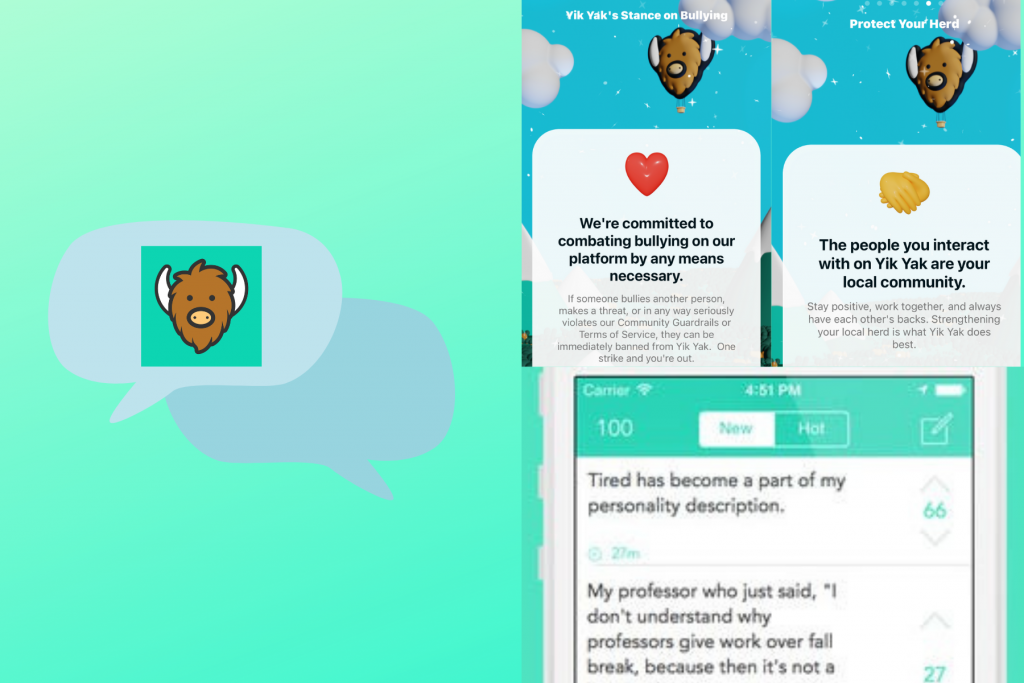Yik Yak makes a comeback at Syracuse
Yik Yak returns to college

The app was just like Twitter, except completely anonymous and the content was based within a persons five-mile radius. A user could go home after school or on vacation with their family and be exposed to entirely new names, opinions, and drama. Within a few months of distribution, Yik Yak was absorbed by students of all ages, and banned in high schools throughout the country.
In the four years that followed its launch, Yik Yak was removed from the App Store due to cyberbullying and threats. It shut down in April 2017. Now, four years later, Yik Yak is back. The app is similar to how it’s always been, but now with more emphasis on community guardrails and trying to create a safe community space for users, the company said. Its return to campuses begs the question, what has Yik Yak done to change things, and what is it doing now to prevent it from being shut down again?
“A lot of the original affordances of the platform like upvotes, downvotes are all in place,” iSchool Professor Jasmina Tacheva said. “So, the newest thing that I see is, indeed, this sort of central importance of being a positive member of the community and also the norms of the community are very prominently displayed.”
As soon as a user signs on, there is a series of pages to help walk through the new guidelines for Yik Yak – which still uses the same seafoam green and cartoon yak to entice users. The pages read, “We’re committed to combating bullying on our platform by any means necessary,” to which users have to press, “I understand,” to continue.
This, Tacheva hopes, will help to mitigate some of the threats and cyberbullying that caused the app to be banned initially.
“I think that the combination of technology and the lessons learned from the past should help them better navigate the context of cyberbullying,” Tacheva said. “However, although AI moderation has gotten stronger in the last four years, only human moderation is truly effective at stopping hate,” Tacheva said.
According to communication and rhetorical studies freshman Danielle Spring, the app is sweeping Syracuse’s campus as well.
“It’s funny to read people’s unfiltered thoughts,” Spring said.
Spring didn’t use Yik Yak in 2013 when it was first released, but she has been frequenting the app, which she heard about from friends. “I like how it’s in the five-mile radius,” she said.
Spring said she uses the app now because it’s funny, but that it really only appeals to a “certain kind of audience.” This “certain kind of audience” of college students is notoriously hard to reach, Tacheva said.
Economics freshman Jordan Backer said after he went to an event on the Quad there was a Yik Yak relating to him.
“Somebody asked about me…and then like 20 people upvoted it. So there you go. A bunch of people thought I was hot,” Backer said.
According to Backer, he enjoys using Yik Yak because it’s amusing and he can see what others are saying about people he doesn’t know.
“It’s also kind of toxic,” Quinn Pierson, geography and environment, sustainability, and policy sophomore, said. “I have seen really mean things about specific people, like first and last name.” Pierson continued saying she wished others realized that the people being insulted on Yik Yak also use the app.
According to Tacheva, this element of anonymity has its risks as well.
“The danger of being anonymous on our social media platforms is always that sometimes the lines between free speech and hate speech get quite blurry,” Tacheva said.
Part of the reason Tacheva said the app was shut down initially was Yik Yak was especially harmful to women of color, who reported feeling emotionally harassed on the app. Additionally, because viewers were reading Yik Yak posts from individuals within five miles of them, Tacheva said the app brought a lot of added stress.
“The sort of current university population is basically … discovering the power, but also the enormous responsibility of posting information online, anonymously,” Tacheva said.





